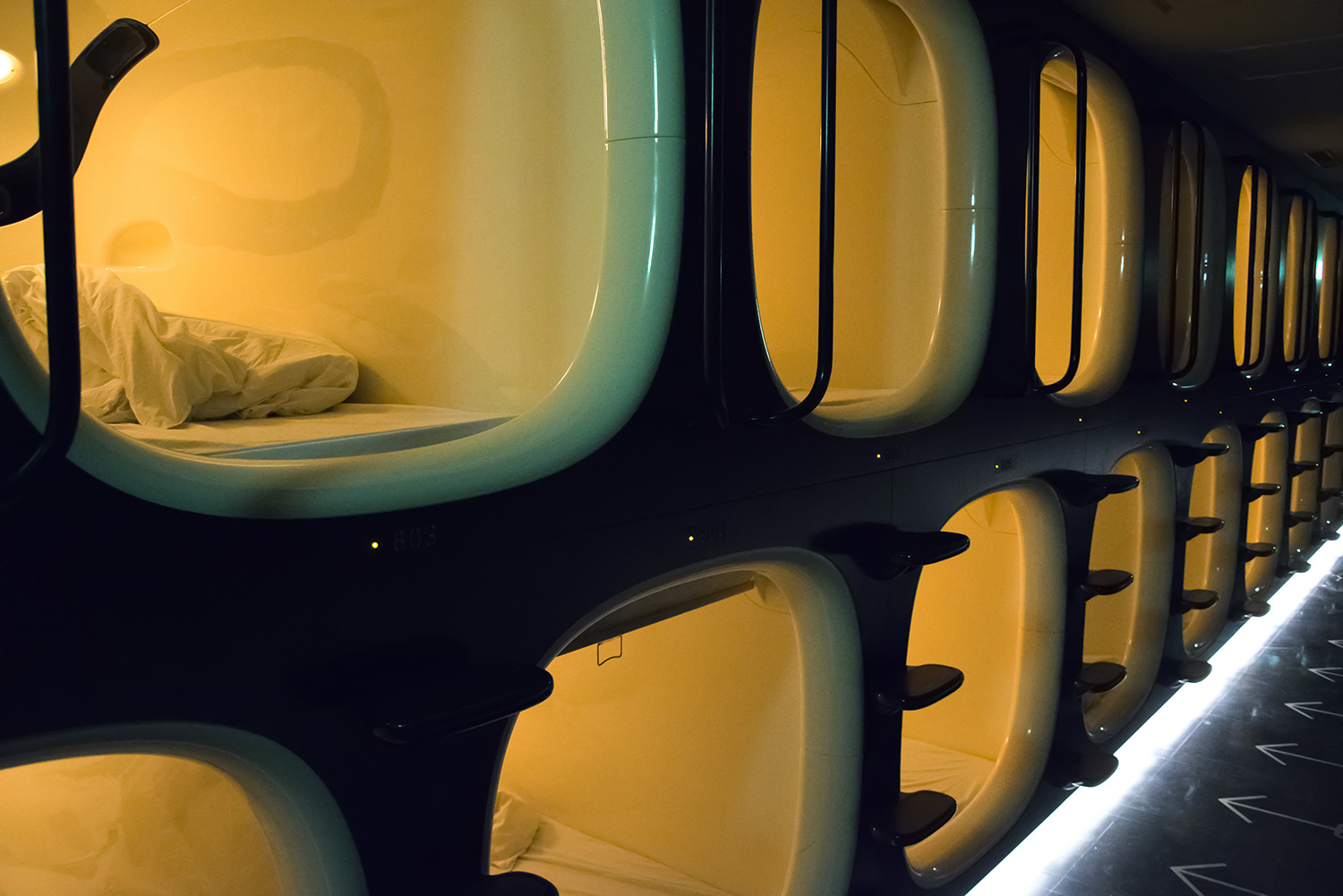

CAPSULE HOTELS – BRILLIANT IDEA FROM JAPAN
Sleeping capsule
In the widespread capsule hotels of the Cherry Blossom Land there are neither rooms nor free-standing beds. Instead, one will find there special bedroom capsules situated in a shared room. Built-in cells of approximately 2x1x1 m in size resemble the interiors of space vehicles, while in others they evoke slightly darker associations. Closed with a curtain or roller blinds, a capsule is usually equipped with a mattress and a small lamp. Today, depending on the standard of a hotel, in its air-conditioned interior one can find a TV set, a game console and even a tablet computer with Internet access. Guests can usually use an independent locker and a shared bathroom. If the hotel does not offer kitchen space, beverage and snack vending machines are provided in the common space. In some cases, the machines take over the roles of hotel staff, and in order to purchase the stay overnight it is enough to buy a ticket at the machine located at the entrance.
Capsule hotels in Japan
It’s no wonder that it was the Japanese who came up with such a cosmic idea. Due to high population density, in Japan each square meter of space counts, so the possibility of packing several times as many people in one room seems to be a perfect solution. The form of capsule hotels reflects the Japanese’s specific nature, too. On one hand, it confirms their modesty and love for simplicity, on the other – it suits their withdrawn and reserved nature. During trips – especially business ones – the ambitious and dutiful Japanese are mainly focused on the objective of the trip, that is why the sole purpose of the accommodation is to satisfy their physiological need for sleep.
Indeed, the hard-working businessmen and thrifty and not very demanding tourists were what Kisho Kurosawa bore in mind while designing the first capsule hotel, which was established in 1979 in Osaka. For years the capsule hotels have served as the accommodation not only for travellers. It cannot be denied that their success is mainly due to economic considerations. Cheap accommodation was a rescue for employees who were late for the last train home, drunken feasters, and recently also for… the unemployed, for whom even a few months’ stay in a capsule bedroom turned out to be more cost-effective than renting an independent apartment or room. In the face of the economic crisis that Japan underwent a few years ago, this phenomenon has become so popular that the state has allowed the “long-term” residents of the capsules to register their residence at the hotel addresses.
Capsule hotels in Tokyo
Although the Japanese patent was implemented in many places all over the world, it is still Japan where the capsule hotels are the most popular, and in Tokyo alone there are more than 60 such hotels (according to www.booking.com). Their standard – both on Japanese islands and all over the world – is extremely diverse. While almost luxurious capsules in the vicinity of the Dubai airport are equipped with a system informing the guest about the time of their departure, hotels where the Japanese unemployed stay horrify with their extreme conditions. So before you decide on an economical capsule travel, check out what exactly you can expect from your property and think about whether the savings really pay off.
The capsule hotels certainly constitute a solution for not demanding, flexible guests, for whom the location and affordable price of the accommodation are more significant than the comfort and high standard. Travellers in all corners of the Earth appreciate the advantages, but in Poland the idea has not arisen the sufficient interest so far. Soon, Japanese idea-inspired establishment is going to open in Warsaw. Warsaw capsules are to be equipped with anti-burglary shutters and even the bathroom reservation system which is supposed to save the time and nerves of impatient guests. Who knows, maybe there will also be amateurs of capsule travel on the Polish market?














